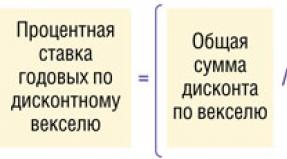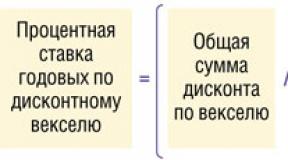Features of obtaining a tax deduction when purchasing an apartment in a building under construction. Property deduction for building a house Tax deduction for building a house changes
According to the provisions of the Tax Code of the Russian Federation, citizens of the country have the right to reimbursement of costs when purchasing a home not only when purchasing finished residential real estate, but also when carrying out construction work on a plot of land. Applying for compensation is possible for the construction of housing directly from the owner’s personal funds, and when taking a targeted loan from credit institutions to cover paid bank interest. In this material, we look in detail at how to get a tax deduction when building a house, talk about what expenses you can claim for compensation, and discuss important points.
Situations in which you can claim a refund during construction
Table 1.Situations when you can apply for a personal income tax refund
| Situations | Example |
|---|---|
| Situation 1. If you built a residential building with your own or borrowed funds. According to the letter of the law, compensation from the state is due when a house is built in which the owner plans to live, therefore, citizens can be registered in it. Otherwise, you cannot expect to receive a deduction. It is only applicable for the purchase of residential real estate. | You bought land in the suburbs to build an individual dwelling, built a cottage, and received a certificate with information from the Unified State Register of Real Estate. You can now apply for an income tax refund for building your own home. |
| Situation 2. Let's imagine that you bought an unfinished building and brought it to life, turning it into a habitable house. In this situation, you are no longer purchasing just land, but an unfinished object, therefore, you are required to provide a contract for the purchase of an unfinished building to receive a deduction, otherwise you will only be able to receive a refund for the purchase of an already standing house, but not for subsequent completion. | You bought a one-story house, having filled out an agreement with the previous owner that was appropriate to the situation. Soon you carried out reconstruction changes to the structure, adding another floor on top. You can only demand compensation for the money spent on purchasing the house in its original condition; reconstruction is not included in this list. |
If you purchased a plot of land and built a country house on it suitable for habitation, and then went through the registration procedure as a structure suitable for habitation, but did not provide the opportunity to register in it, you would not be able to apply for state compensation.

You can learn more about the deduction for the purchase of land from ours. Let's consider what amount you can expect, the circumstances of the return, and also in what timeframe it is possible to receive a deduction.
And if, under an official agreement on the sale and purchase of an object, you bought an unfinished three-story cottage, and after the purchase completed the construction and registered it as your property, you can claim a refund not only of the funds spent on the purchase, but also for the completion of the object under construction and its finishing.
List of expenses included in the list available for reimbursement
According to the letter of the law, there is a list of certain expenses during the construction of a residential property, for which you can apply for partial reimbursement. All of them are presented in Article 220 of the country’s main set of rules governing tax legal relations.

Among them:
- costs aimed at purchasing a plot of land for subsequent construction of housing;
- funds given for the purchase of a plot of land with an unfinished building standing on it, which is meant to be a residential building upon completion of construction work;
- costs of purchasing materials for the construction of a residential property, as well as the necessary finishing elements;
- funds spent on the preparation of design and estimate documentation;
- money given for the installation and connection of utility networks and other communication systems to the building.
Note! A verbal description of costs is not a sufficient basis for receiving money. To return funds, you must provide documentary evidence of expenses incurred, in the form of checks or receipts.
List of expenses that are not grounds for refund of contributions
Now let's look at the list of expenses for which you can apply for funds from the state:
- when spending money on reconstruction and other improvements to an already built and registered house;
- when carrying out redevelopment in a finished house;
- when installing necessary equipment, such as a toilet, bath or shower, electric, gas heating boiler, etc.;
- if extensions and utility compartments, as well as any other separate objects, such as a bathhouse or garage, were built on the site.
Let's give an example. You built a cottage on your own land, and then installed a brick garage and a wooden bathhouse. You do not have the right to add the last two objects to the list of expenses eligible for compensation, since according to the law only funds spent on the construction of a residential property (house) and finishing work in it are included there.
Emergence of the right to receive state compensation for construction costs
A citizen has the right to demand monetary compensation for the costs of a house he built himself when he registers it as residential property. To prove that the taxpayer has successfully completed the registration procedure, it is necessary to provide the relevant structures with a certificate from the Unified State Register of Real Estate.

It turns out that if you built a cottage on your plot in 2014, then you have the right to apply to the Federal Tax Service for compensation of funds in 2015.
Let's give an example. You started the process of constructing a residential building at the beginning of 2012, and completed its construction in mid-2014. Registration of the constructed cottage as a property and entry into the Unified State Register of Real Estate took place in 2015; it turns out that you can apply to the authorities for the return of some of the funds only after 2016.
At the same time, filing for the next year after the registration procedure period is not mandatory; you still have time, since you can submit papers to receive a deduction for the past 36 months.
Let's give an example. In 2013, you built a cottage on your site and went through the procedure of registering ownership. In 2013 and 2014, you were not officially employed, and only in 2015 did you get a job with a “white” salary and an employment contract. It turns out that you can activate your income tax refund only in 2016 and receive all payments for 2015. At the same time, the amount due to you that has not been issued in full will be carried over to subsequent years.
If you already have a certificate from the Unified State Register of Real Estate in your hands and you don’t want to wait until the end of the year, then apply for funds at your place of work. Yes, you will not receive a single payment, but you will gradually return 13% of your salary every month until the entire amount due to you is paid.

What documents do you need to have to process a refund?
To apply for a property deduction in accordance with the rules required by law, you must submit the following papers to the tax office:
- Certificate with information about the constructed housing from the Unified State Register of Real Estate.
- Declaration form 3-NDFL, filled out by the payer independently.
- Photocopies of payment documents and other documents indicating the occurrence of costs. They can exist in the form:
- copies of contracts concluded with individuals or receipts from them, indicating passport data and details;
- copies of contracts concluded with construction companies, payment orders, etc.;
- sales receipts for payment for materials used during construction and finishing work;
- a statement written by the property owner in which he requests a deduction;
- certificate from the accounting department at the place of work 2-NDFL;
- photocopies of all pages of the passport.
- If a citizen receives a deduction to cover interest on a targeted loan taken from a credit institution for the construction of a residential building, he must provide:
- agreement between the bank and the borrower;
- certificate of payment of interest to the bank.
Don't know how to fill out forms? You can familiarize yourself with these topics on our portal. Step-by-step instructions, sample forms, and how to avoid basic mistakes when filling out a declaration.
Video - Complete package for tax deductions
Maximum amount available for receipt
The amount of compensation from the state issued for the construction or completion of a residential building on a land plot is determined according to the standard scheme for property deductions, that is, in the same way as for other types of property.

The maximum you can return is no more than 13% of the total amount of costs incurred during the construction of the object, and it is not allowed to exceed the amount of 2,000,000 rubles.
Every year you have the right to return an amount not exceeding the total funds deducted from your income to the country's budget at the same time. If you do not receive the money in full within the specified time, then the remaining amount is transferred to payment for the next 12 months and so on until all the money in the due amount is returned.
Let's give an example. In 2014, you built a house on the site for further living in it. The total funds spent on the construction procedure and finishing work amounted to 10,000,000 rubles. You have the right to a tax refund based on covering costs in the amount of no more than 2 million rubles of the amount. However, since you are married, your husband can also claim a return of funds in the amount of 13% of two million, and it turns out that out of 10 million only four will be compensated.
If you took out a mortgage and built a house not in 2014, but in 2013, then you can repay all the interest paid in full, without restrictions, since such restrictions came into force only in 2014, from the first day of January.
If, as in the problem above, the house was purchased in 2014, then you can get a maximum of 13% of 3,000,000 rubles to cover interest, that is, 390,000 rubles.
You have the right to receive compensation for credit interest only if the house was registered as housing with the right to register in it. Among other things, you have the right to submit a deduction also for expenses incurred during construction, and not just for mortgage interest.
Is it possible to include expenses incurred after registering real estate in the list of expenses?
Very often, finishing work and expenses for the purchase of materials continue to occur for quite some time before receiving an extract from the Unified State Register of Taxpayers. Therefore, the question arises, is it possible to include them in the list of tax refund costs, and also, is it possible to change the amount required for deduction after it has already been declared once?
The Federal Tax Service of Russia decided that the answer to the question of including these funds in the list will be positive, in addition, even if the deduction had already been provided at the time of their inclusion, the amount can still be changed and the balance can be obtained. In this case, a change in the amount will only be possible by the amount of current costs.
Let's give an example. In 2014, you independently built a two-story house on a plot of land and registered it as your residential property, while construction costs amounted to one and a half million rubles. In 2015, you submit a declaration for the past year to the authorities and receive a refund. In the same year, you carry out additional finishing work on the house for another half a million, it turns out that in 2016 you will be able to submit another declaration to the authorities, already for 2015, thanks to which you will claim the full amount of 2 million for deduction and receive the missing 13% from 200 thousand rubles.
Let's sum it up
As you can see, the refund of property deductions due to the construction of a residential building on a land plot is made according to a standard scheme, similar to all types of similar real estate. To receive it, you also need to collect a standard package of documents and submit them to the tax office at your place of residence. We wish you success in receiving state compensation and in carrying out construction work!

Each taxpayer during the construction of a residential building who has not yet used a property deduction has the right to receive a tax deduction up to a maximum amount of 2,000,000 rubles. The maximum amount of income tax that you will receive in your hands is 260,000 rubles.
In this article we will look at the following issues in more detail:
- How to get income tax when building a house
- Costs of building a residential building
- List of required documents for income tax refund
- Methods for filling out and submitting a declaration to the tax office
Property deduction for building a house
You can receive a deduction for the costs of building a residential building only after registration of ownership.
There is no statute of limitations for the property deduction, but it can be returned only for the three years preceding the filing of the declaration and only for income received in the year of registration of property rights and later.
The legislator grants the taxpayer the right to take advantage of the property tax deduction only once. If the property deduction cannot be used in full during the tax period, the balance is carried over to the next year and beyond.
The maximum tax deduction cannot exceed 2,000,000 rubles, excluding amounts used to pay off interest (if a mortgage was taken out for the construction of a house).
The costs of constructing a residential building are:
- costs for the development of design and estimate documentation;
- expenses for the purchase of construction and finishing materials;
- expenses associated with the work or services of a construction company for the construction, completion of a house, or finishing of a house;
- expenses for the purchase of a residential building, including those with unfinished construction;
- costs associated with connecting to electricity, water supply, gas supply and sewerage networks.
List of necessary documents for obtaining income tax when building a house
To reimburse the deduction for the construction of a house, you must prepare the following package of documents:
- Declaration in form 3-NDFL;
- A copy of the Certificate of registration of ownership of the house;
- Copy of the passport;
- Copy of TIN certificate;
- Certificate of income in form 2-NDFL for the reporting year (from all places of work for the reporting year);
- A copy of the loan agreement (if a construction loan was taken out);
- A copy of the Certificate of registration of ownership of the land plot;
- A copy of the contract with the construction company;
- A copy of payment orders, cash receipts, invoices confirming the cost of expensive construction materials;
- Application addressed to the head of the tax authority at the place of registration for the provision of a property deduction;
- An application addressed to the head of the tax authority at your place of registration for a refund of income tax to your personal account;
Methods for filling out and submitting the 3-NDFL declaration
Drawing up a 3-NDFL declaration to receive a property deduction for building a house is a complex procedure; in order to prepare the necessary package of documents, draw up a declaration and submit them to the tax office, it will take you a lot of time. If an error is made, you will have to re-draw up the declaration and submit it to the tax authority again, thereby increasing the period for consideration and payment of the deduction.
Therefore, we recommend contacting specialized accounting companies, such as BUKHprofi. BUHprofi specialists will draw up a declaration and prepare all the necessary documents and applications within a day. Next, the company's courier will meet you at a place convenient for you to sign the declaration and applications, followed by submission to the tax authority.
This method is not only convenient, but also reliable: the risk of an erroneously drawn up declaration, as well as distortion of the submitted data, is minimized.
When buying or building a house, Russian citizens have the right to deduct 13% from their personal income tax. You can get it either through the Federal Tax Service or from your employer. It is provided at cost and consists of 3 parts:
Tax deduction for house construction
Everyone has the right to reimburse their expenses incurred in the construction of their own house or part of it. This provision is enshrined in tax law. To do this, he needs to use the property tax deduction when building a house according to the established rules.
According to the provisions of the Tax Code of the Russian Federation (namely, paragraph 2, paragraph 1, article 220), all citizens of the Russian Federation receive deductions from personal income tax in the amount of their actual costs when constructing residential buildings (houses, cottages) for themselves.
Actual expenses for building a house are considered for property deduction, including funds spent on:
- design;
- building materials;
- construction services, including finishing production;
- installation of engineering communication systems (water supply, gasification, electricity).
The general composition when applying the taxpayer’s right to a property deduction when building a house does not include amounts for the construction of additional buildings - garages, fences, sheds and other things.
All money spent must be documented: contracts, acts (with stamps), checks. This is due to the fact that we do not have a tax deduction for building a house on our own.
Tax deduction when buying a house
If a person did not build, but bought himself a house, cottage, or a certain share of it, he also has the right to receive a similar deduction for his financial investments and reimburse 13% of the money spent.
If he purchased an unfinished object, he can easily include in the calculation the money spent on its completion. In this case, the transaction agreement must contain an indication of this fact.
Additional costs for creating or improving housing conditions are not included in the costs for obtaining a refund. For example, for redevelopment, reconstruction, equipment.
Tax deduction for building a house, what documents are needed?

In order for a taxpayer to receive the tax deduction due to him during the construction of a residential building, it is necessary to prepare and then submit it personally or through an authorized representative to the Federal Tax Service the following documents:
- A declaration completed in a strictly prescribed form for the corresponding year. Its form is approved annually and has some differences from previous forms due to changes in the law. Therefore, a declaration, for example, for 2015 cannot be filled out using a 2014 or 2013 form.
- Certificate of income for the corresponding year. It confirms the income received and the amount of personal income tax deducted from it.
- Copies of personal documents:
- general passport (main page and page with the applicant’s place of residence registration);
- TIN certificates.
Copies of documents confirming the existing ownership of the constructed house:
- certificate of its state registration;
- loan agreement (for a mortgage).
Copies of financial documents with which the applicant confirms his payment:
- buildings (checks, statements, receipts);
- mortgage interest (certificate from the bank).
This list of documents is standard. It is enough to use your tax deduction for the construction of a private house for a person who is the sole owner of the property. If the constructed object is divided into shares between several owners, then documentation will be required confirming this fact and statements about the distribution.
Tax deduction when buying a house with a mortgage
In addition to the general return within the limits of the costs incurred or from the maximum, buyers of country real estate can return part of the paid interest on target (mortgage) loans. Previously, it was not limited to anything. Now, starting in 2014, a specific limit has been established for bank loans. A maximum of 3 million rubles is accepted for calculating reimbursement of mortgage repayment costs.
Example 1:
You bought a house in 2010 with a mortgage and paid interest on it in the amount of 3,200 thousand rubles. To return:
3200 x 13% = 416 (thousand rubles)
Example 2:
You purchased the house with a mortgage in 2015. In 2025, interest paid will amount to 3,600 thousand rubles. Since the transaction was made after January 1, 2014, the deduction will be calculated from the maximum limit:
3000 x 13% = 390 (thousand rubles).

With a long period of repayment of a mortgage loan, the total amount of interest payments will most likely exceed the limit of 3 million rubles.
For one home, the deduction is used once, regardless of whether it is all exhausted or not.
The maximum amount of financial resources to be returned for the purchase of a private house or its construction has certain restrictions: for residential buildings purchased or erected before 2009 - 130 thousand rubles, after - 260 thousand rubles, that is, doubled. The tax deduction for the purchase of a home in 2016 has no change in the maximum size limit and remains the same.
When an individual used his property deduction for the construction of a private house not all, the balance is automatically transferred to the future (based on Article 220 of the Tax Code of the Russian Federation).
In the event that the recipient of the deduction was temporarily unemployed and did not have any income that is taxed at a rate of 13%, then he can resume the refund from the moment it appears.
Property deductions for the construction of a house or its purchase have no statute of limitations. You can claim it at any time, even after 15 years. However, tax refundable will be calculated based on the last 3 years preceding the year of application.
The procedure for a citizen to receive his deduction includes a number of successive steps:
- Filling out and certifying the declaration with signatures.
- Obtaining a 2-NDFL certificate from your place of work.
- Preparation of a package of copies of documents that confirm ownership and payment.
- Submitting prepared documentation with the application to the Federal Tax Service.
In Art. 88 of the Tax Code of the Russian Federation determines that the verification of the declaration is carried out no more than 3 months from the date of its receipt.
After verification by the Federal Tax Service, funds are transferred to the applicant’s bank account. However, if the tax specialist identifies errors, you will have to submit an adjustment and again wait 3 months to use the tax deduction for the construction of a residential building.
Personal income tax on a constructed facility is returned only after its completion. As a general rule, refunds are made for past years. Thus, receiving a tax deduction for the construction of a house built in 2017 can only begin in 2018.
In reality, there are numerous non-standard cases - the purchase of country real estate:
- by both spouses in common ownership;
- parents with minor children;
- pensioners;
- in exchange with some additional payment.
Each such case has its own nuances. There are many constant changes in legislation. Therefore, close attention should be paid to processing personal income tax refunds when purchasing or building houses.
Many citizens know that when buying a home, they can receive partial compensation from the state in the form of a refund of income tax paid.
Dear readers! The article talks about typical ways to resolve legal issues, but each case is individual. If you want to know how solve exactly your problem- contact a consultant:
APPLICATIONS AND CALLS ARE ACCEPTED 24/7 and 7 days a week.
It's fast and FOR FREE!
But you can take advantage of this benefit not only when buying, but also when building a house. How to reimburse expenses incurred during the construction of a home?
Conditions
You need to think about how to return the tax deduction when building a house in advance of construction. The final amount of the deduction is directly dependent on the amount of money spent.
To do this, it is necessary to document the costs. The maximum amount of compensation from the state is thirteen percent of two million rubles, that is, two hundred and sixty thousand.
A tax deduction is a type of state compensation provided for by tax legislation. The regulation of such compensation is provided for in the Tax Code of the Russian Federation.
Its amount varies depending on the amount of funds spent. But at the same time, the volume of the basic basis for calculation cannot exceed two million rubles. A tax resident of the Russian Federation has the right to apply for a tax deduction when constructing a home.
This can also be a person who does not have Russian citizenship, but has resided on Russian territory for at least one hundred and eighty-three days over the previous twelve months. The main condition is the regular payment of income tax by the applicant.
As a rule, the employer pays income taxes. If the employment is not officially registered and the employee receives a salary without any documentary support, then it will not be possible to issue a tax deduction.
Also, minor citizens, non-working pensioners, students, entrepreneurs and the unemployed are not entitled to a deduction.
A citizen who used various subsidized funds for construction is also not entitled to receive a tax refund. In this case, citizenship and collected papers on expenses incurred do not matter.
Refunds of personal income tax are excluded when using maternity capital for construction. The same applies to construction projects with financial assistance from the employer.
If we outline the main conditions for the return of personal income tax during construction, they are as follows:
- the citizen must be officially employed, that is, be a taxpayer of the Russian Federation;
- construction was carried out only at one’s own expense without the use of government subsidies or employer assistance;
- expenses must be documented.
It is important that you can only issue a tax refund once. There is no tax deduction for re-construction.
There are also some nuances of tax refund when building a house. For example, what if the house was built with money from a loan? In this case, the Tax Code of the Russian Federation states that a tax refund is possible only when applying for a targeted loan.
That is, if the loan was taken specifically for construction. When applying for a consumer loan, no compensation is due.
And if you purchased an unfinished house, how to get reimbursement of expenses? In this case, deduction is possible only if the purchase agreement states that an unfinished house is being sold.
If a house is built on land purchased specifically for this purpose, then you can apply for a deduction only after the citizen has acquired ownership of the land and house.
How to apply
To apply for a construction tax refund, you must contact the tax office at your place of residence. When applying, you will need to submit the necessary documents.
The next step is to fill out the declaration. In addition to the funds spent on construction, it is necessary to indicate all available income, for example:
- sale of property;
- provision of one-time services;
- receiving payment for rent and the like.
- individual data of the applicant;
- article defining the right to receive a tax deduction during construction;
- amount to be refunded;
- bank account to which funds should be transferred;
- signature and date.
You can also get your income tax back through your employer. In this case, a similar appeal to the tax authorities will be required. After checking the information and if the decision is positive, the Federal Tax Service issues a notification.
It should be submitted to the accounting department at the place of work. Throughout the year, wages will be paid without deducting thirteen percent.
The peculiarity of compensation is that in a year you can only receive an amount equal to the amount of income paid. That is, if a taxpayer paid, for example, seventy thousand rubles in personal income tax during the year, then this is exactly the amount he will receive.
The unpaid balance of the tax deduction is carried forward to the next year. You need to repeat the entire procedure of applying to the Federal Tax Service, resubmit documents and apply for compensation for the current year.
What documents are needed
The most important thing when applying for a personal income tax refund after building a house is to provide all the necessary documents.
These include:
- purchase and sale agreement of a land plot for individual housing construction;
- financial documentation confirming the purchase of construction materials (sales receipts, receipts, bank statements, receipts, acceptance certificates);
- certificates of work performed when involving construction companies (for connecting communications, completing or constructing a house, drawing up an estimate or project).
All other expenses, for example, the purchase of construction tools or repayment of bank commissions, are not taken into account when applying for a tax deduction.
In addition to documents evidencing expenses incurred, you will need to provide:
- declaration completed according to the form;
- a certificate from the place of work about income in the form;
- application for a tax deduction;
- application for compensation for overpaid income tax;
- Bank account details or a copy of your passbook.
In order to correctly fill out the 3-NDFL tax return, you will also need to prepare certain documents, in particular:
- certificates from all places of work for the years indicated in the declaration, issued by the employer’s accounting service in form 2-NDFL;
- a document confirming the ownership of housing;
- act of acceptance and transfer of housing, if there is participation in shared construction;
- agreement of purchase and sale, assignment of claim or investment;
- payment documents with mandatory indication of full name. (receipt cash order, seller's receipt of funds, bank payment);
- taxpayer's passport details, permanent registration address, postal code;
- bank account details.
Terms for returning personal income tax for the construction of a private house
Currently, there is no statute of limitations for filing an application for a property deduction.
However, it should be borne in mind that the right to a personal income tax refund arises only from the moment of acquiring ownership of the house. That is, upon receipt of the owner’s documents, you can apply for a deduction only the next year or later.
Years before the owner’s right is confirmed, it will not be possible to receive a personal income tax refund. That is, expenses incurred in earlier years cannot be included in the base for calculating compensation.
As for the return period, it all depends on the refund option. If the taxpayer decides to return the money through the tax office, he will receive the funds to his current account in a single payment.
In this case, the return period may take up to six months. First, a thorough check of the applied taxpayer and all his documents is carried out within three months.
02.02.2016
Taxpayers who buy housing (houses, apartments, rooms, etc.), build it or acquire a plot of land for these purposes have the right to property tax deductions.
Property tax deduction is provided when purchasing or building a house. A deduction is also provided for the cost of repaying interest on loans for the purchase of housing or land.
For what expenses is a property deduction provided in 2016?
The property tax deduction consists of three parts and is provided for expenses:
- For new construction or acquisition on the territory of the Russian Federation of residential real estate (shares in them), land plots for them.
- To repay interest on targeted loans (credits) received from Russian organizations or individual entrepreneurs, actually spent on new construction or the acquisition of housing (share(s) in it) and land for it on the territory of the Russian Federation.
- To repay interest on loans received from Russian banks, for refinancing (on-lending) loans (credits) for the construction or acquisition of housing (share(s) in it), a land plot for it, on the territory of the Russian Federation.
The maximum amount of expenses for new construction or purchase of housing in the Russian Federation, from which the property deduction will be calculated, is 2 million rubles. If the property was acquired after January 1, 2014, the deduction limit applies to expenses incurred for the acquisition of one or more real estate properties.
The maximum amount of expenses for the construction and purchase of housing and land for it when repaying interest on targeted loans or credits is 3 million rubles. The restriction applies to loans (credits) received after January 1, 2014. The amounts of interest paid on targeted loans (credits) received before 2014 can be included in the property deduction in full without any restrictions.
If the taxpayer has exercised the right to receive a property tax deduction not in full, the remainder of the deduction can be carried forward to subsequent tax periods until it is fully used (clause 2, clause 1, article 220 of the Tax Code of the Russian Federation).
The expenses taken into account when calculating the 2016 property tax deduction include:
For new construction or acquisition of a residential building (share/shares in it) on the territory of the Russian Federation:
- development of design and estimate documentation;
- purchase of construction and finishing materials;
- the actual acquisition of a residential building (share(s) in it), including at the stage of unfinished construction;
- construction (completion) and finishing works or services;
- organization of electricity, water and gas supply and sewerage (including autonomous) at a residential property.
When purchasing an apartment or room (shares/shares in them) in the Russian Federation:
- the actual purchase of an apartment or room (shares/shares in them);
- acquisition of rights to an apartment or room (shares/interests in them) in a house under construction;
- purchase of finishing materials;
- work related to the finishing of an apartment or room (shares/shares in them), including the development of design and estimate documentation for finishing work.
Expenses for the completion and finishing of a purchased house or finishing of a purchased apartment or room can be deducted only if the relevant agreement specifies the acquisition of an unfinished residential building, or an apartment or room (rights to them) without finishing.
Other expenses are not taken into account as part of the 2016 property tax deduction. For example, these are expenses associated with the redevelopment and reconstruction of premises, the purchase of plumbing and other equipment, execution of transactions, etc.
How to get a property deduction
1. Fill out a tax return in form 3-NDFL. If it calculates the amount of tax to be refunded from the budget, then you must also write an application for a personal income tax refund in connection with the costs of purchasing property.
2. Obtain from the accounting department at your place of work a certificate of the amounts of accrued and withheld taxes for the corresponding year in form 2-NDFL.
3. Prepare copies of payment documents:
- confirming the taxpayer's expenses when purchasing property (receipts for receipt orders, bank statements about the transfer of funds from the buyer's account to the seller's account, sales and cash receipts, acts on the purchase of materials from individuals indicating the address and passport details of the seller and other documents) ;
- evidencing the payment of interest under a target credit agreement or loan agreement, mortgage agreement (in the absence or “burnout” of information in cash receipts, such documents can serve as extracts from the taxpayer’s personal accounts, certificates from the organization that issued the loan about the interest paid for using the loan)
4. Make copies of documents confirming the right to housing:
- when constructing or purchasing a residential building - a certificate of state registration of the right to a residential building;
- when purchasing an apartment or room - an agreement on the purchase of an apartment or room, an act on the transfer of the apartment or room (share/shares in it) to the taxpayer, or a certificate of state registration of the right to the apartment or room (share/shares in it);
- when purchasing a land plot for construction or for finished housing (shares/shares in it) - a certificate of state registration of ownership of the land plot or share/shares in it and a certificate of state registration of ownership of a residential building or share/shares in it;
- when repaying interest on targeted loans (credits) - a targeted credit agreement or loan agreement, a mortgage agreement concluded with credit or other organizations, a schedule for repaying the loan (loan) and paying interest for the use of borrowed funds.
5. If the property was acquired into common ownership, you will also need:
- a copy of the marriage certificate;
- a written statement (agreement) on the agreement of the parties to the transaction on the distribution of the amount of the property tax deduction between the spouses.
6. Provide the tax office at your place of residence with a completed tax return with copies of documents confirming actual expenses and the right to receive a deduction when purchasing property. You must have their originals with you for verification by the tax inspector.
In what cases will it not be possible to obtain a property deduction?
Property tax deduction does not apply in the following cases:
- if the purchase and sale transaction is concluded with a citizen who is interdependent in relation to the taxpayer.
- if payment for the construction (purchase) of housing was made at the expense of employers or other persons, funds from maternal (family) capital, as well as from budgetary funds;
Interdependent persons are recognized as: an individual, his spouse, parents (including adoptive parents), children (including adopted children), full and half brothers and sisters, guardian (trustee) and ward (Article 105.1 of the Tax Code of the Russian Federation).
When purchasing property in common shared ownership before January 1, 2014, the amount of the deduction is distributed among the co-owners in accordance with their share/shares of ownership. If it was purchased later, a property deduction is provided in the amount of actual expenses incurred by each of the co-owners within the limits of the overall established deduction limit. At the same time, parents who have minor children and purchase housing in common shared ownership with them have the right to apply a property tax deduction without distribution by shares.
If housing was purchased under an exchange agreement with an additional payment, this is not a reason for refusing to receive a property deduction, since the Tax Code does not prohibit this option for purchasing housing.
Property acquired by spouses during marriage is their joint property, therefore they both have the right to a property tax deduction, including the right to distribute it by agreement.
Read also...
- Presentation on the topic "African countries" Presentation on the topic any African country
- Interconnection of global problems
- Analysis of the motivation management system in a travel agency Methods of managing staff motivation at tourism enterprises
- Analysis of the ratio of income, expenses and financial results Ratio of profit and expenses


















